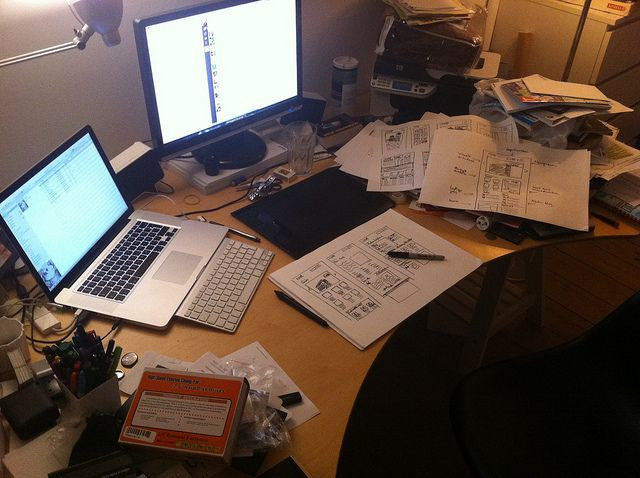A Clean Environment Leads To Healthier Behavior, But A Messy Desk Inspires Creativity

Is your home messy or clean? Your behavior could depend on it, and each has its benefits.
Researchers at the University of Minnesota had suggested with previous work that clean settings led people to do good things, such as refraining from crime and littering, and showing more generosity, but they wanted to see if benefits could come from both sides, and found that "you can really get valuable outcomes from being in a messy setting," according to psychological scientist Kathleen Vohs.
"If a clean environment is all about doing what's expected of you, then what does it mean to be doing things people don't expect of you?" Vohs told the Daily News. "That sounded like a loose definition of innovation and creativity," and that's exactly what Vohs found.
Read More: Larger Desks And Bigger Car Seats Lead To More Dishonest Behavior
Vohs and her team of researchers first experimented on the effects a clean room has on people. They asked a group of 34 participants to answer questionnaires in an office. For some participants, the offices were clean and clutter-free, but for others, papers and other office supplies were scattered around. After they filled out the questionnaires, they were asked to donate money to a children's charity and given the option of taking either an apple or a chocolate bar.
Results showed that 82 percent of participants who were in the clean room offered to donate money, compared to only 47 percent of those in the messy room. Participants in the clean room also went with the healthier option — the apple — 67 percent of the time, compared to only 20 percent of those in the messy room.
Vohs' next experiment looked at whether messiness inspired creativity. The researchers asked all the participants to figure out new ways to use a ping-pong ball. But as they devised these ideas, they were sitting at a conference table that was either really messy or really neat. At the end, impartial judges decided that those who were at the messier table had more creative ideas, even though all participants came up with the same amount of ideas.
"Disorderly environments seem to inspire breaking free of tradition, which can produce fresh insights," Vohs said. "Orderly environments, in contrast, encourage convention and playing it safe."
Read More: Eat At Your Desk If You Want To Be More Productive At Work: How Going Out To Lunch Reduces Cognitive Ability
Still, Vohs had one more experiment. She sat 188 participants at a computer desk and asked them to choose a smoothie from the menu of an imaginary smoothie restaurant. Again, some participants were in a messy environment while some were in a neat one. She found that people were almost twice as likely to go for the smoothie labeled "new" — as opposed to "classic" — if they were in the messy environment.
"In general we want people to follow the rules, stick to the norms, and do what's expected of them. That's how society is run," she said. "But occasionally it is helpful to break free from all of that and branch out and do something fresh and new."
People who want to be more creative could start by keeping old magazines or newspapers around for a few more days before throwing them out, Vohs suggested. By doing this people might be able to influence their behavior.
Source: Vohs K, Redden J, Rahinel R. Physical Order Produces Healthy Choices, Generosity, and Conventionality, Whereas Disorder Produces Creativity. Psychological Science. 2013.
Published by Medicaldaily.com



























